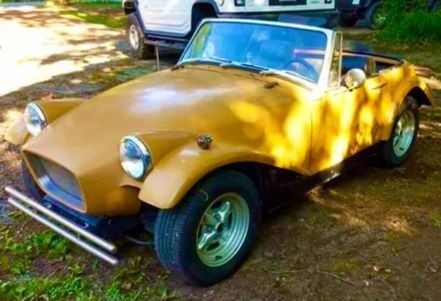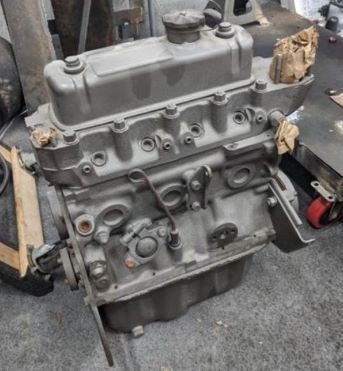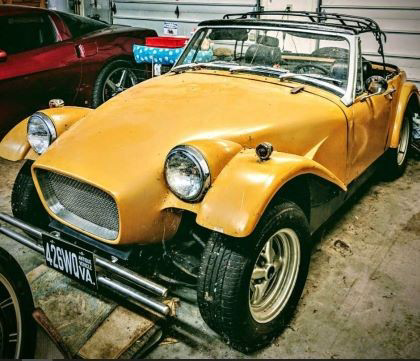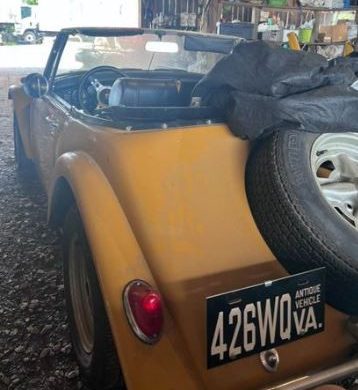The bane of British car ownership, that four-letter word, the curse that robs our pocketbooks – rust. In 1970, John Britten, an enthusiastic club racer, began offering fiberglass bodies to drop onto Sprite chassis ranging all the way from Bugeyes to last-year 1980 Spridgets. His garage was located in Arkley, near London, so his new venture was called the Arkley. Lenham Motor Company – already making rebodied Sprites – constructed the bodies for Britten – roughly 900 to 1000 examples, all told. Most were kits but Britten also sold completed cars. Not only did the new Arkley body eliminate concerns about sheet metal rust, but it also resulted in a car lighter by 300 lbs, making Arkleys competitive on the track. This Arkley – found for us by Chuck Foster – is located in Rockville, Virginia, and it’s seen a lot of work to bring it to near-driving condition. The rebuilt motor and transmission still require fettling – the carburetors need tuning and the clutch must be replaced.
Spridget engine options ran from the 1958 Bugeye’s 948 cc in-line four-cylinder to the 1980 Midget’s Triumph-based 1.5 liter; perhaps the most desirable of the earlier A-series engines is the 1275 cc, and that’s what’s installed in this Arkley. Receipts indicate that the engine was rebuilt in 2019; around the same time, the owner acquired a rebuilt ribcase four-speed transmission. The twin SU carburetors were supplied by a vendor in North Dakota and are also said to be “new”. Replacing the bad clutch is an engine-out affair, but removal isn’t difficult – just time-consuming.
The remnants of the ’73 Midget are apparent with one glance at the cowl, where three wipers sit nestled on the windshield – all Midgets sold to the US from ’69 on had three wiper blades. The Arkley’s design echoes elements of the Morgan and the Lotus Super Seven, with prominent fenders, bullet-style headlamps, and a slanted rear where the spare is mounted. This car has two simple round bars for bumpers and handsome four-spoke wheels. The top bows are with the car, but the listing doesn’t mention whether a convertible top is included.
Finding an Arkley in the US is not easy, though Brits may have an easier time of it: Peter May Engineering apparently still sells the Arkley body. This example looks like a great start for someone either planning to run it as is (after repairs), or utilizing the mechanical bits to resurrect a Spridget project. Listed for $5000 here on facebook Marketplace, the price is less than the cost of the motor and transmission. Have you ever driven an Arkley? Let us know in the comments below.








I’ve only had one British car, a Triumph Spitfire. You’ll be shocked to learn it had electrical problems. Also the floors were gone from rust.
So far I’ve only owned one British car, a 1960 Vauxhall Victor. Much of the electrical system had been sourced from Lucas, but it also had some Delco-Remy components.
That car provided many unforgettable lessons in automotive diagnosis and repair, especially of the electrical kind.
Nice car. The 1275 and rib cage transmission are the best of the breed and with 300 lbs less to move should move this guy down the road quickly. Steering wheel is a 3 spoke aftermarket unit and since the engine and transmission both need to come out it is made easier by being able to take off the entire front end. Price about right for the condition of the car even though the clutch needs replacing. Clutch is not expensive from Moss Motors.
Yeah, there’s no information about the suspension, or more importantly, the frame and the body bits under the fiberglass. That said, the Arkley looks like it would be hoot to drive, and it would be a star at any British car meet…or just about anywhere.
It would take a bit of a sense of humor but a big smile and a shrug of the shoulders should convince just about everyone. (Convince them of what is another matter).
It had to be you, Michelle….to feature such an interesting little critter. I was about 15 in the UK when these appeared but John Britten was already a formative influence because of his irreverent and informative adverts in the Motor Sport. He also ran a woman driver, Gabriel Kònigg who was brilliant. Britten was a clever businessman but an enthusiast to the core who went on to many other activities, including selling model cars and finally a major shareholder in MSV, the company which controls many of the UK´s racing circuits.
So it was typical of Britten´s sense of irony/fun to parody Morgan with a car that looked like that of Enid Blyton´s cartoon ggodt twoshoes “Noddy” and then call it the SS, which still had Gestapo overtones in Swingin´ London…..Arkley SS had no space for luggage but was beautifully simple, could race, rally and off road for no momey at all.
This example is very cheap for waht it is, even if it will struggle to find someone who understands it in the US. The person who does get it will have a barrel-fun of laughs and be able to invent any story they want about the car at Cars & Coffee,,,,,,
The Arkley was not a complete body kit, nor a complete body replacement – it was merely a new fiberglass front end and rear end that are installed on the existing Sprite/Midget “tub” after removing the (usually) rusty or damaged original parts. Thirty – forty years ago the late Stan Huntley of FASPEC in Portland Oregon sold the kits. I’m not sure if he bought them, or took an original kit and used it as a mold to produce copies that he sold. I am not aware of any cars being subsequently re-registered or re-titled as Arkleys, but rather the modified Sprite/Midget retained whatever make (Austin or MG) that it was born with. Sprites up through 1967 were Austin-Healey Sprites, I believe it was in 1968 that BMC dropped the “Healey” part of the name (so that they wouldn’t owe royalties to Donald Healey) and the cars became mere Austin Sprites until production stopped. The MG Midget retained that name for the entire length of it’s production.
Good information, Chingatrailer. Just goes to show how cheap BL was over royalties. Almost no-one bought an Austin Sprite ´it made no sense at all to do so! BL management also dropped the Cooper badge for exactly the same reason. Now just look what BMW have done to add value to Minis with “Cooper” branding in the 21st century!
Just to add that the procedure you describe for rebodying a Spridget, hacking off front and rear but leaving the screen and doors intact was how I remember all these special bodied Spridgets (Lenham mainly) were built in any number. A company called WSM did completely rebody the car, in the style of an early 60s Italian GT, but it was exteremly expensive and few were built.
I’ve driven an Arkley!
https://youtu.be/W-wThQ6pDMs?feature=shared
was this the same John Britten that built the 1000cc Britten motor bike racer in New Zealand